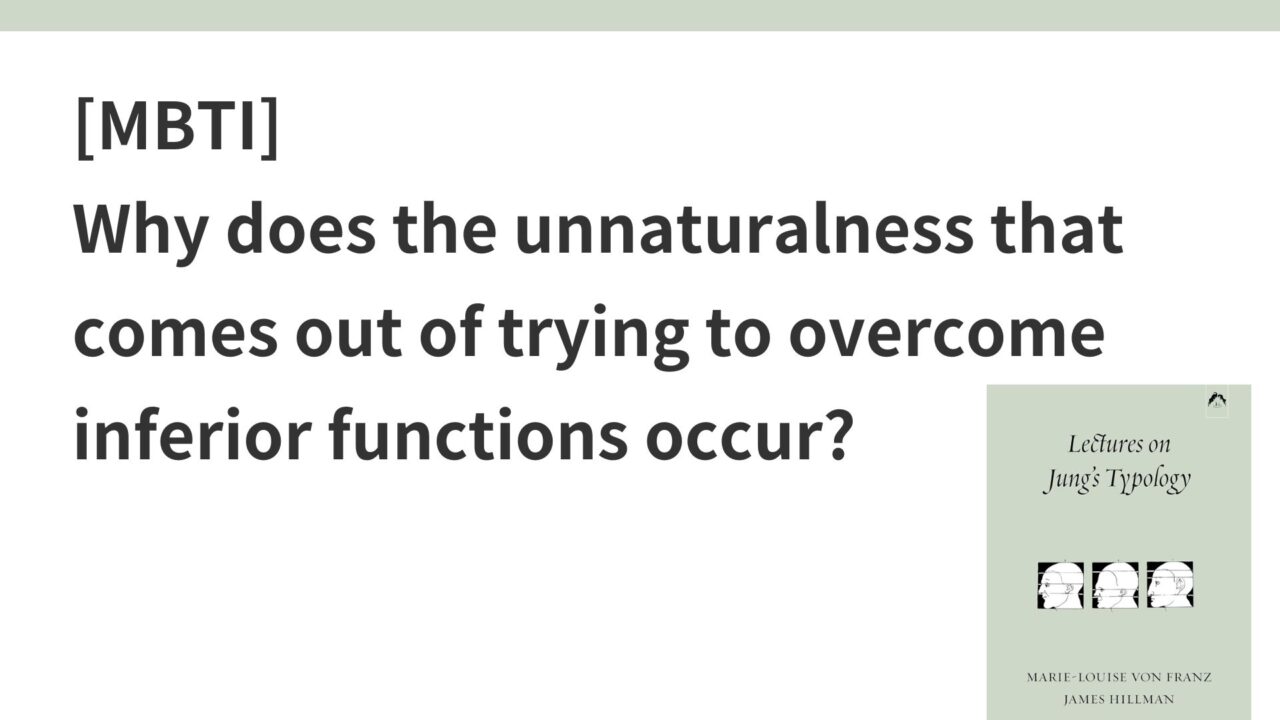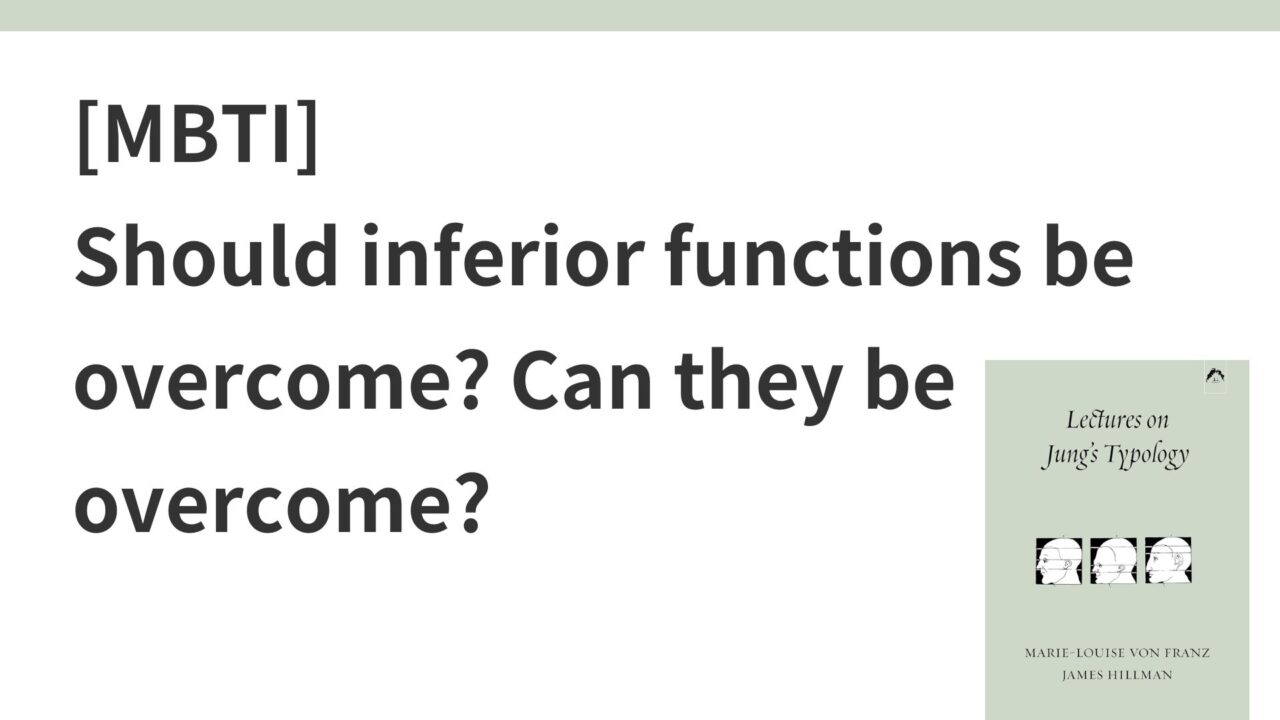Introduction.
After reading through the MBTI and Jung’s typology, I became interested in “inferior functions” and read this book to dig deeper.
The book is called “Jung’s Lectures on Typology” written by Marie, who spent nearly 30 years with Jung as his student and collaborator until Jung’s death.
In this issue, I would like to summarize the inferior function.
Is each type recognized from childhood?
Type differentiation begins in childhood. For example, the two attitudes “extroverted” and “introverted” are actually found in children.
For example, an introverted child will not enter that room unless the parent tells him or her in advance that there is a table, chair, or other furniture in the room. In the case of introverts, they are more guarded because they view objects in the outside world as energy-suckers. The opposite is true for extroverted children, who actively try to enter the room because they get energy from objects in the outside world.

Thereafter, with respect to each function (thinking, intuition, sensation, and emotion), a trend begins to be seen in entering kindergarten, although it is not as congenial as extroversion and introversion.
Children have a natural tendency to procrastinate or try to force others to use functions they do not feel good at. For example, with summer homework at school, they will finish the things they are good at first but put off the things they are not at the last minute.
And because the adults around the child regard the dominant function as a “talent” and work toward developing the strengths, the dominant function often undergoes a process of increasing and the inferior function naturally degenerates.
On the other hand, there are rare cases where a child is encouraged by his or her surroundings to strengthen functions that are the opposite of the child’s natural personality type. For example, a child born with an emotional type is trained to think due to the efforts of parents who wish to strengthen his or her “thinking.
In this case, the child develops as a “Distorted” type, which has both advantages and disadvantages. While the disadvantage is that the dominant function cannot be developed to its full potential, the advantage is that it is easier to adapt when the need to develop auxiliary or tertiary functions arises in adulthood.
As for the determinants of this personality type that is recognized from childhood, it is not known. Heredity is considered as one factor, but is unknown.
What is an inferior function?
First, Jung’s typology tells us that thought and emotion, sensation, and intuition, have opposite qualities.
If thought is the superior function, emotion will always be the inferior function. The reverse is also true.

We start from the assumption that these two opposing functions cannot be expressed simultaneously.
Combined with the external factors just mentioned, the dominant function becomes more and more prevalent in the normal course of events, and the inferior function is relegated to the unconscious. It does not mean that they are completely gone; they do not appear in the conscious mind, but they are working in the unconscious mind.
Construction and unnaturalness of pseudo-responses to inferior functions
Unlike the dominant function, the inferior function is relegated to the subconscious and is not used frequently, so its response is inevitably slower than the dominant function.
For this reason, thinking-type people are very often seen by others as “emotionless”. In reality, however, it is not that they have no emotions, but that they are unable to express them at the appropriate moments. It is correct to say that emotions are there somewhere, but they cannot be expressed when they should be.
For example, a thinking type may shed tears when he hears that his friend’s husband has died, but when he meets the widow, he may not be able to offer a single word of sympathy. When he was at home before, he had no emotion, but when he is put in the right situation to express his condolences, he is unable to bring it out instantly, and those around him who see this are seen as “that person is rational and emotionless”.
However, this is not conducive to living in society, and many people find, relatively early in life, that their inferior function is an emotional, vulnerable, and unadaptable place.
Therefore, they unconsciously develop the habit of cheating their own inferior functions through pseudo-reactions.
The custom of deception is to refer to the socially accepted way of behaving that is required in the moment. For example, in the case of the funeral mentioned above, one might use a cliché from a “list of funeral etiquette” found on the Internet.
Other thinking types produce a molded amiability and emotional display, as well as conventional expressions of emotion, such as giving flowers or bringing chocolates.
Conversely, when emotional types are forced to think and react, their true feelings have not yet reached a level where they can express them, so they make a lot of commonplace statements and unintended thoughts or try to pass them off with memorized material.
In this way, they manage to get by by deceiving the inferior function, but because it is manual, it inevitably remains unnatural, whether in the thinking or emotional type.
Therefore, these compensatory reactions should not be taken for granted or ridiculed as this is his/her personality type.
Can you master the inferior functions?
The answer to this question is that, to some extent, one can learn to respond in a similar manner by learning patterns of response in light of socially accepted norms.
Is it really possible to completely overcome this inferior function? And if so, should we make a conscious effort to do so (should we overcome our weaknesses)? What will be the balance between the dominant and inferior functions of the developed personality type?
I will describe these in the next article.




